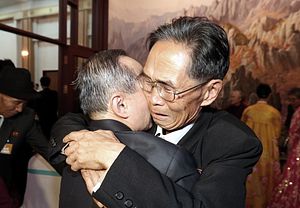As the world eagerly awaits the much-anticipated summit between U.S. President Donald Trump and North Korean leader Kim Jong-un, media coverage has mostly focused on political and economic issues. It’s possible that this meeting will be nothing more than a high-profile handshake and a memorable photo finish, with few tangible deliverables.
Due to a lack of communication and transparency regarding North Korea, both policy experts and the general public are left to speculate on the outcome of the summit. Is Pyongyang genuine about denuclearization? What does Kim Jong-un really want from negotiations? Will the North Korean economy eventually collapse? Scholars and commentators can debate these questions until the cows come home, but there is one issue that must be included on the agenda.
There are still thousands of elderly Americans of Korean descent who have not seen their loved ones in North Korea since the outbreak of the Korean War. Trump should acknowledge the urgency of this crisis and include the issue of U.S.-North Korea family reunions at the upcoming summit. The United States and North Korea have disagreed on many policies, not to mention basic historical facts, but if there is any issue that the two sides can agree on, it is the union of family.
Some pessimists say that at this point, divided families are a sunk cost. They lament that it is a great tragedy, but we should all try to move on and focus on the pressing challenges of the future. Imagine suddenly being separated from your partner, not knowing the whereabouts of your only child, or not being able to talk to your sibling for 70n years. If, God forbid, you were in this situation, would you just shrug your shoulders and try to forget about them?
The stories of divided family members in Jason Ahn’s Divided Families documentary — such as that of Chahee Lee Stanfield, a 77-year-old grandmother in Illinois — show that these wounds cannot be mended so easily. Despite battling cancer, Chahee has worked ceaselessly to make sure that the voices of divided families are heard. Like many other divided family members, she has not lost hope.
Inspired by my own grandfather, who was born in what is today North Korea and passed away without recovering from the physical and emotional scars of the Korean War, I became a volunteer for Divided Families USA (DFUSA). Our organization has successfully advocated for multiple pieces of legislation such as House Concurrent Resolution 40; bipartisan support for this issue confirms that family reunions are fundamentally a human issue that should not be politicized. We have kept close contact with the State Department and Red Cross, two key entities that can help facilitate the logistics of reunion pilot programs. The most important part of our work has been on the grassroots level — keeping an updated registry of Korean-American elders across the country who still wish to participate in an official family-reunion program.
Despite these efforts, family reunions have remained an elusive pipedream for most Korean-American elders. Though there have been 20 reunion programs between North and South Korea, Korean-Americans have not been allowed to participate in them, and there has never been a successful reunion program implemented between the United States and North Korea. Some individuals have paid exorbitant sums of money to black-market brokers in China to arrange visits to North Korea to meet long-lost family members. Needless to say, this method is unreliable and unsustainable for many Korean-American elders.
It would be idealistic to think that a brief reunion would be a panacea for a much bigger issue: the division of a country that has enforced strict restrictions on travel and communication. However, the most immediate issue is respecting elderly American citizens and their right to be reunited with their families and loved ones.
After all, these divided families are the only remaining human link between the United States and North Korea, and time is quickly running out. Giving these war-torn families the opportunity to see each other for the first time in almost 70 years is a universal human right that should transcend partisan, national, and generational boundaries.
The Singapore summit is the best and final chance for the United States to make reunions a reality. Family reunions are a low-hanging diplomatic fruit that can build trust, de-escalate tension, and most importantly, give these elderly people a long-deserved opportunity for closure. We owe it to our divided families who have sacrificed so much for us.
Paul Kyumin Lee is a recent graduate of Yale University and an incoming junior fellow in the Asia Program at the Carnegie Endowment for International Peace in Washington, DC. He is the vice president of Divided Families USA, a non-governmental, non-profit organization that advocates for a formal mechanism of reunion for Americans of Korean descent and their direct relatives in North Korea who were separated during the Korean War.

































